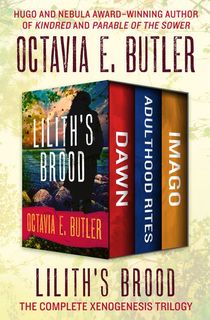I had the honor of being Octavia Butler’s editor at Warner Books (now Hachette) for eight years, from 1993 to 2000. During that time the company published the Earthseed novels, Parable of the Sower and Parable of the Talents. We communicated frequently and I saw her often in New York; I visited her in Pasadena as well.
Yet I cringe when I recall our first meeting.

An autographed page from Parable of the Talents, from Butler to Mitchell.
Photo Credit: Betsy MitchellOctavia had come to New York to see her agent and her hardcover publisher. I was fairly new at Warner Books, though I’d been in New York publishing for more than a decade by then. I invited her to visit the Warner offices and then took her to lunch.
I’d made reservations at a fancy place downstairs in our building, wanting to give her a nice meal. Bad choice, though; I hadn’t realized she was a vegetarian, and there was little on the menu to tempt her. She made do with a salad, and I probably ordered a stiff drink.
RELATED: 10 Octavia Butler Quotes to Live By
We exchanged life stories, as new acquaintances will. I probably sounded a bit prideful in telling her that I, a graduate of the University of Nebraska, moved from Omaha without knowing anyone in the publishing business and had worked my way up to senior editor of the science fiction line now publishing her books.
"I insisted that my success was the equivalent of hers, since I’d climbed the ladder on my own."
Download the complete Earthseed series!
Then Octavia shared some of her own story—her father had died when she was seven; she was raised by a mother who was a domestic worker, and her grandmother; how she had been determined to become a writer against the naysaying even of close relatives who said she’d never succeed.
We somehow got onto the topic of white privilege. I insisted that my success was the equivalent of hers, since I’d climbed the ladder on my own (though with a family of moderate means who could have helped out financially if I’d needed it along the way).
RELATED: Sign up for a Free, New Webinar Series Celebrating Octavia E. Butler
She tried to wake me that day. She really did. Gave me statistics on generational wealth in Black families versus white. I don’t remember what else. I simply didn’t hear it back then. She was gracious, and of course we finished our meal on a cordial basis—but it’s painful to think back on now.
RELATED: Science Fiction and Fantasy Books by Black Authors You Need to Read
We went on to many successes together. I was her in-house cheerleader year after year. Warner re-released her Patternist and Xenogenesis novels with amazing new cover art that broadened her readership.

The Nebula Awards banquet in New York City during which Octavia Butler received the 1999 Nebula Award for Best Novel for Parable of the Talents. Octavia is flanked by Warner Books staffers Wayne Chang, Editorial Assistant, and Senior Editor Betsy Mitchell.
Photo Credit: Charles N. Brown, Locus PublicationsWe celebrated her long-overdue Nebula Award for Parable of the Talents (see image of us above). Our publicity department sent her on book tours and got her on The Charlie Rose Show.
She became the flagship of Warner’s list of Black authors; I wanted to grow Black voices in science fiction/fantasy and we published many during that time, including Nalo Hopkinson, LeVar Burton, Steven Barnes, Walter Mosley and the World Fantasy Award-winning Dark Matter: A Century of Speculative Fiction from the African Diaspora, edited by Sheree R. Thomas.
Although I could not hear the truths she told me when we first met, my time with Octavia continues to illuminate my understanding. I am humbled to have had the opportunity to be her editor.
This post is sponsored by Open Road Media. Thank you for supporting our partners, who make it possible for The Portalist to celebrate the sci-fi and fantasy stories you love.


